Licenses, GEMA, personal rights and copyright: For some, all this may sound boring. But it is important to have at least a basic knowledge of the legal principles. Because if you violate rights, you can expect (expensive) consequences. This article gives you a compact overview of the most important facts about live streaming music.
Table of contents
+
(Editor’s note: This article is no legal advice. It is intended to help you to get an overview of the complex subject matter. For legal advice, please contact a lawyer’s office).
To get started with this topic, we first need to clarify a few terms. This is because there are often gaps in knowledge that can unintentionally lead to legal violations. To avoid this, the first part provides an overview of the most important terms. After that, we’ll take a deeper look at the topic of music for livestreams and show which music can be used and who to contact.
Explanation of terms
Copyright protects intellectual property
Copyright protects intellectual property on an ideal and material level. It clarifies the relationship between an author, the created work and possible subsequent or further use. Thus, ownership and the associated economic interests are protected and regulated. Works are, for example, texts, pictures or pieces of music – but also, for example, computer programs or technical drawings.
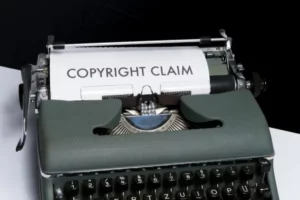
Anyone who violates copyrights must expect legal consequences. Photo: Markus Winkler / Unsplash
Accordingly, you are not allowed to use any song as a streaming soundtrack without the rights being clarified. If the author died 70 years ago or more, the work is considered to be in the public domain. Then you are allowed to use it. However, only if the rights have not been transferred to someone else (music label or individuals).
So you can remember: In general, you are not allowed to use anything just like that. And it is important to know that copyright cannot be transferred. However, the author can transfer the rights of use and exploitation by means of license agreements. Only after death can the copyright be transferred in the context of inheritance settlements. The author therefore always remains the author. Only the copyright notice can change if the rights of use and exploitation have been granted, for example, to collecting societies or publishers. So remember: The author does not always have to be identical with the rights owner. Further information can be found here.
Personal rights
The right of personality is one of the basic rights. It protects all humans against interferences into their life and liberty range. This is stated in Art 2 German GG:
(1) Everyone shall have the right to the free development of his personality, provided that he does not infringe the rights of others and does not violate the constitutional order or moral law.
(2) Everyone shall have the right to life and physical integrity. The freedom of the person shall be inviolable. These rights may be interfered with only on the basis of a law. (Source: Basic Law for the Federal Republic of Germany Art 2)
The European Union published some more information.
You will find information all over the internet concerning other countries, for example the US.
This means that privacy and intimacy, the right to the spoken and written word, the right to one’s own image, and the rights to resocialization and informational self-determination are thereby protected. If one or more of these rights is violated, a person has the option of claiming damages, injunctive relief or the right of withdrawal. This also applies after death.
Incidentally, the personal rights mentioned here apply to individuals. For companies, i.e. legal entities, the corporate personality right applies, which is intended to protect companies in particular from statements that damage their reputation.
“Digital Millennium Copyright Act” (DMCA)
The Digital Millennium Copyright Act, or DMCA for short, helps to ensure that copyright infringements on the Internet, for example through digital reproductions, can be legally prosecuted. The law thus basically protects works from digital, illegal copying.
When do I need a GEMA license for streaming in Germany?
GEMA represents the rights of authors. Many created works are listed there. So first check whether the piece of music you want to use is registered there. All authors who are represented by GEMA then receive compensation through it. In combination with some social media platforms, however, the situation is sometimes different. Let’s say you want to broadcast a livestream with music via a large social platform such as Facebook or YouTube, Twitter or Twitch, which themselves offer a blanket license agreement with GEMA. Then you don’t have to pay extra licensing fees to GEMA, because the platform already does that. The obligation for individual licensing then drops for you. However, there is one exception: If you earn money from the event in another way (tickets, donations, etc.), you have to pay additional GEMA fees. Also, if you create a recording of your livestream and make it public, either via a website or via a social platform, you have to pay an extra license: a license package for video-on-demand streaming. This is different from the livestreaming license.
Good to know: GEMA offers worldwide royalty payment. They have concluded reciprocal agreements with almost all foreign copyright societies. This allows them to collect royalties for you not only in Germany, but worldwide.
By the way: All important information can be found on the info pages and help sections of the individual platforms:
- Twitch – Music and copyright guidelines
- Facebook – information on copyright and posting of contributions and Facebook Sound Collection
- Instagram – the same guidelines apply here as on Facebook
- YouTube – manage copyright infringement and music rights on YouTube
- TikTok – intellectual property rules and adding sound
What does a GEMA license cost?
That depends on which license you need. All license packages can be viewed at the GEMA license store (only in german language). For example, if you want to run a live stream with music registered with GEMA via your website, i.e. without a flat-rate contract via social media, then you will always need the license package for linear streaming. The license package is called VR-OD 10, which you can access via the license store and click on the Online field. The distribution channel to be selected would then be “On music and video portals, private websites, company and club websites”. Next, you will be asked for the form of use, there you can decide between “On Demand”, “Background Music” and “Linear Streaming”. You have to specify your information. By the way, GEMA clarifies the three different ways of using music. This is very helpful to get individual details before booking a license fee. For example, you can read all the information about music use on the Internet there. You also find an english help section.
Here’s what you need to keep in mind when licensing in livestreams

Live streaming project with music. Photo: Unsplash
For licensing for linear streaming, you must specify how large your reach is. The fee is based on this. There are graduated rates. For example, if you earn up to 24,000 euros per year with live streaming, the VR-OD 10 tariff, which can be purchased online, is enough. For other tariffs, GEMA states that you have to write an email.
It should also be noted that licensing depends on how large the share of music in the livestream is. The smaller the musical content, the lower the fee.
We have already mentioned the on-demand issue. However, it should be noted again at this point that the rate for linear streaming is also only valid for a live stream. As soon as recordings are made, you need another license for the on-demand content. GEMA explains that linear streaming is when video and audio is shown to the audience at a specific time – even if the stream is stopped in between and can be watched again after a maximum of two hours. This is still considered a live stream.
“If the livestream is to be shown once again linearly on the website at a later date, this use is covered by the licensing. Only the additional accesses must subsequently be included.” (Source: GEMA)
What happens if you violate rights?
If you play protected music in a livestream, there may be legal consequences. The copyright holder may then claim compensation for damages. It is also possible that your content will be deleted from your account, for example on YouTube or another platform. If this happens more often, the account may be blocked. Sometimes the authors or the collecting societies also send warnings. The platforms react differently to infringements of this kind, so it is not possible to make a general statement about what happens if you have infringed copyright or other rights. However, criminal prosecution can be expected. An essential note is that in such cases it does not matter whether you were aware of your violation at the time of the infringement or not.
Without GEMA: What kind of music can I stream?
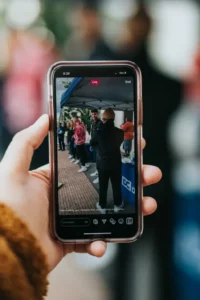
There are several options for music in live streams. Photo: Nathan Dumlao / Unsplash
There are several ways to use music for livestreams – , even without going through GEMA. This is what you should keep in mind:
Royalty-free is not the same as cost-free!
With royalty-free music, you must remember that this does not mean that the music is not protected by copyright. This is just wrong, because a piece of music is always a protected work.
License acquired, but for what?
You have purchased a license or permission to use from a rights holder.
Caution: If you have acquired the rights of use and/or exploitation for a livestream, this does not automatically mean that you may also use the music for recorded, i.e. video-on-demand content. Keep this in mind and consider in advance what you need the music for. It’s only royalty-free if it’s in the public domain, for example, 70 years after the author’s death.
GEMA free? Contact the author directly
You want to use a piece of music that is GEMA-free. Here you have to be careful, because this does not mean that a work is in the public domain. The author is merely not a member of a collecting society such as GEMA. In this case, you must ask the author directly for the rights of use. You can find out whether a work is exploited by GEMA or not in the GEMA database.
Using CC licenses
Creative Commons licenses allow you to use works without paying an extra license fee. If a piece of music is subject to a CC license, read in each individual case, for which purposes you may use the work with a CC license: commercial, private, editorial. With images, it is often necessary to name the author. With music this is also possible.
Write it yourself
The possibility to create music yourself applies to people who have experience in this or who work with songwriters or music composers.
Recommended providers for music licenses
In the following, we present some platforms where you can license music for livestreams, partly for free, partly with a subscription.
Creators often use this provider when streaming on Twitch and YouTube. There is a free and some fee-based options.
This offer is especially popular on YouTube. It is paid, but in return you also have a wide selection with high-quality sounds.
Music for Twitch at no charge: Soundtrack by Twitch
Many users wonder if you actually need a GEMA license to livestream on Twitch. Since the topic is complex and the requirements sometimes change, we refer to the Twitch guidelines for copyrights and music.
A free provider is StreamBeats. However, this one is not usable for commercial use.
This tool works closely with Twitch, but also supports YouTube. There is a large selection here and you don’t have to dig very deep into your wallet for a Gold account either.
Another music video license provider is Artlist. It supports numerous platforms. If you want to be as flexible as possible as a creator, it might be worthwhile to subscribe here.
The record label NoCopyrightSounds is well suited for playing longer background tracks. You can find playlists on YouTube, Spotify or Soundcloud.
You can find more providers of music for livestreams here (german language).
But always pay attention to the purpose you want to use the music for. Some titles are not allowed for commercial purposes.




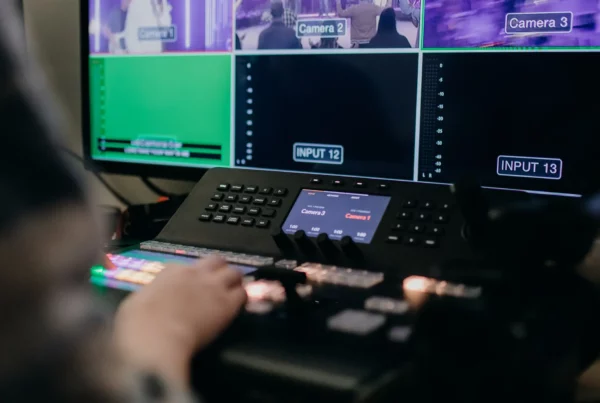
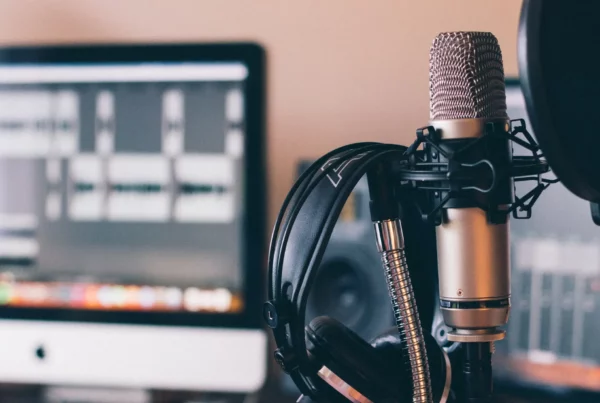
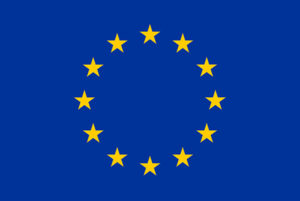 This project has received funding from the European Union’s Horizon 2020 research and innovation programme under grant agreement No 876239, 959379 & 965502.
This project has received funding from the European Union’s Horizon 2020 research and innovation programme under grant agreement No 876239, 959379 & 965502.
